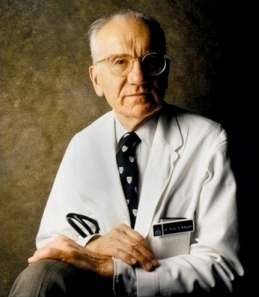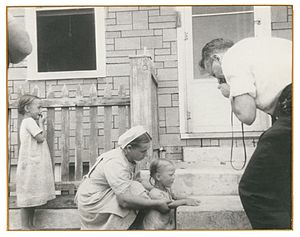Victor A. McKusick facts for kids
Quick facts for kids
Victor Almon McKusick
|
|
|---|---|

Victor McKusick
|
|
| Born | October 21, 1921 |
| Died | July 22, 2008 (aged 86) |
| Alma mater | Tufts University Johns Hopkins University |
| Known for | Mendelian Inheritance in Man, OMIM and McKusick–Kaufman syndrome |
| Awards | William Allan Award (1977) Lasker Award (1997) Japan Prize (2008) |
Victor Almon McKusick (born October 21, 1921 – died July 22, 2008) was an American doctor who specialized in internal medicine and medical genetics. He was a Professor of Medicine at the Johns Hopkins Hospital in Baltimore.
Dr. McKusick strongly supported mapping the human genome. This is like creating a detailed map of all the genes in the human body. He believed it was very useful for studying diseases that people are born with. He is famous for his research on the Amish community. He also created and edited a very important catalog of human genes and genetic disorders called Mendelian Inheritance in Man (MIM), which later became Online Mendelian Inheritance in Man (OMIM). Many people call him the "father of medical genetics."
Contents
About His Life
Victor McKusick and his identical twin brother, Vincent L. McKusick, were born on October 21, 1921. Victor was one of five children. His father was a dairy farmer who used to be a high school principal. His mother was an elementary school teacher. Victor and his siblings grew up on a dairy farm in Parkman, Maine.
In 1937, when Victor was a teenager, he got a serious infection in his armpit. He spent ten weeks in the hospital, including at Massachusetts General Hospital. This was his first big experience with doctors and hospitals. He later said that this experience made him want to become a doctor.
Victor married Anne Bishop McKusick in 1949. Anne was also a professor at Johns Hopkins Hospital. They had two sons, Victor and Kenneth, and a daughter, Carol.
His Medical Journey
Becoming a Doctor
After high school, Victor went to Tufts University for three years. He was very interested in Johns Hopkins Medical School because of its focus on medical research.
During World War II, Johns Hopkins Medical School allowed some students to join without a bachelor's degree. Victor was one of the first to do this in 1942. He earned his Doctor of Medicine degree in just three years. He never got a bachelor's degree, but he received over 20 honorary degrees later in life. He chose to stay at Johns Hopkins for his residency, training to be a heart doctor. At that time, there wasn't a special department for genetics.
Working at Johns Hopkins
In 1956, Dr. McKusick went to a big meeting in Copenhagen about human genetics. This meeting was a key moment for the field of medical genetics. In the years that followed, he became a leader at Johns Hopkins.
In 1957, he started and led a new group called the Division of Medical Genetics at Hopkins. This was a very important step for studying genes and diseases. He continued to teach, do research, and practice medicine at Johns Hopkins until he passed away in 2008.
Important Organizations and Work
In 1960, Dr. McKusick helped start a yearly course on medical genetics in Maine. In 1966, he published Mendelian Inheritance in Man (MIM). This was the first book that listed all known human genes and genetic disorders.
Later, in 1987, the full text of MIM became available online for free. It was called Online Mendelian Inheritance in Man (OMIM). The last printed version was in 1998, but the online database is still updated all the time. It's connected to the National Center for Biotechnology Information. When Dr. McKusick died, OMIM had almost 19,000 entries!
In 1989, he became the first president of the Human Genome Organization. This group helps with the worldwide effort to understand the human genome.
His Research and Writings
Dr. McKusick wrote many articles and books about the history of medicine, genetics, and medical genetics. He also helped start a scientific journal called Genomics in 1987.
He often told his students that to truly understand a topic, you need to know its history. He also liked to ask about the people behind the names of diseases, like Marfan syndrome or Down syndrome. He believed this helped students learn more about the conditions themselves.
Studying Genes Among the Amish
One of Dr. McKusick's most famous research projects was his study of genetics among the Amish people in Lancaster, Pennsylvania. He chose to study the Amish because they are a close-knit community. This means they often marry within their community, which can make it easier to trace genetic conditions through families.
His studies helped identify several genetic conditions, including Ellis–van Creveld syndrome. Dr. McKusick found fifteen reasons why studying the Amish was helpful for genetic research. Other scientists also found the Amish community very cooperative in helping them understand inherited diseases. He published his findings in 1978 in a book called Medical Genetic Studies of the Amish.
Awards and Honors
Dr. McKusick received more than 20 honorary degrees during his career.
Some of the important awards he won include:
- Gairdner International Award (1977)
- William Allan Award (1977)
- NAS Award for Scientific Reviewing (1982)
- Benjamin Franklin Medal for Distinguished Achievement in the Sciences (1996)
- Albert Lasker Award for Special Achievement in Medical Science (1997)
- Japan Prize for Medical Genetics (2008)
The McKusick–Nathans Institute of Genetic Medicine at Johns Hopkins Hospital was named after him and another famous geneticist, Daniel Nathans.
His Passing
Victor McKusick passed away from cancer at his home in Towson, Maryland, on July 22, 2008. He was 86 years old. The day before he died, he watched a live online class about medical genetics, a course he helped create many years ago.


